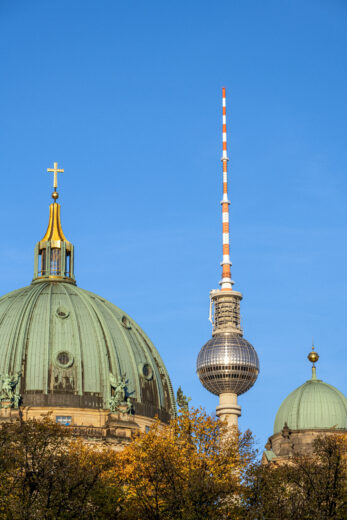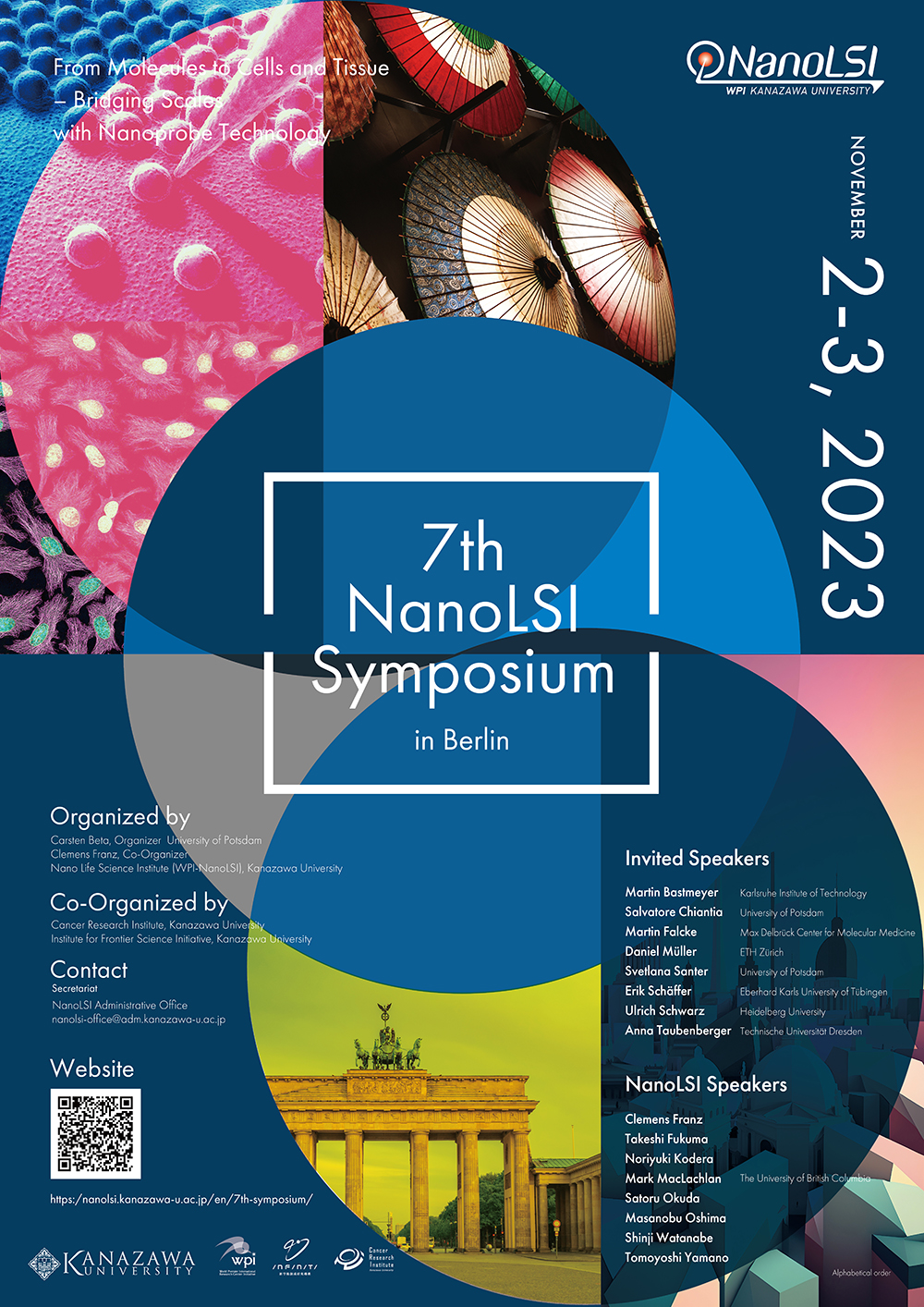From Molecules to Cells and Tissue – Bridging Scales with Nanoprobe Technology
Posted:Jun 29, 2023

The cathedral and the TV tower in Berlin.

Download PDF [2MB] JPEG [1MB]
Nano Life Science Institute (WPI-NanoLSI) consists of four fields: Nanometrology, Life Science, Supramolecular Chemistry, and Computational Science. Through the fusion of four fields, we aim to elucidate the molecular mechanisms of fundamental life phenomena, such as the replication and reading of genetic information and cell division, as well as higher-order life phenomena, such as immunity, memory, and thinking at the nanoscale level.
The NanoLSI Symposium is held as an international symposium to promote further transdisciplinary research and new collaborations with researchers from diverse backgrounds. We are pleased to announce that the 7th NanoLSI Symposium in 2023 will be organized by NanoLSI Overseas PI Prof. Carsten Beta (University of Potsdam) and held in Berlin, Germany, for the first time. During the two-day symposium on November 2 and 3, distinguished researchers from Japan, Canada, Switzerland, and Germany will gather to discuss cutting-edge nanoprobe technologies under the theme of “From Molecules to Cells and Tissue – Bridging Scales with Nanoprobe Technology”.
Organizer
- Carsten Beta University of Potsdam NanoLSI Overseas PI
Co-Organizer
- Clemens Franz NanoLSI
Oral Session – At Goethe Hall
Invited speakers
- Martin Bastmeyer Karlsruhe Institute of Technology, Germany
- Salvatore Chiantia University of Potsdam, Germany
- Martin Falcke Max Delbrück Center for Molecular Medicine, Germany
- Daniel Müller ETH Zürich, Switzerland
- Svetlana Santer University of Potsdam, Germany
- Erik Schäffer Eberhard Karls University of Tübingen, Germany
- Ulrich Schwarz Heidelberg University, Germany
- Anna Taubenberger Technische Universität Dresden, Germany
NanoLSI speakers
- Takeshi Fukuma Nanometrology
- Noriyuki Kodera Nanometrology
- Shinji Watanabe Nanometrology
- Clemens Franz Nanometrology
- Masanobu Oshima Life Science
- Tomoyoshi Yamano Life Science
- Mark MacLachlan Supramolecular Chemistry The University of British Columbia
- Satoru Okuda Computational Science
Poster Session At Meitner Hall
We will also have a poster session in parallel.
One of the objectives of this poster session is to provide an opportunity for young researchers from Japan and Germany, including students, to introduce and discuss the research they are conducting with each other, and to help them expand their research activities globally.
Eight researchers from NanoLSI will participate in the symposium. In addition, the call for participants in the poster session from Germany and neighboring areas is already open. Please refer to “What’s New!” below for details. Participants of the poster session can attend the 7th NanoLSI Symposium at the same time.
What’s New!
We are pleased to announce that we are now starting open call for poster abstracts.
Please see below for details.
Open Call for Poster / The 7th NanoLSI Symposium in Berlin Application deadline: Friday, October 11, 2023 Extended. —->Applications have been closed. Thank you.
Poster presenters from NanoLSI
- Madhu Biyani
Nanoscale visualization of Aptamer-CYP24 complex binding dynamics in the development of aptamer therapeutics in cancer
- Kee Siang Lim
Nanoscopic evaluation of anti-SARS-CoV-2 spike neutralizing antibody using high-speed AFM
- Kien Xuan Ngo
Deciphering actin structure-dependent preferential cooperative binding of cofilin
- Kenichi Umeda
Submolecular-scale observation of topological transition of Smc5/6 holocomplex
- Rei Yagasaki
Exploring the mechanics of cortical dendrite formation through AFM measurements
- Dilireba Bolidong
Separation of small extracellular vesicles (EVs) using an anion exchange column and revealing their mechanical properties by AFM
- Taisei Suzuki (PhD Student, Div. of Nano Life Science of Grafiniti)
High-speed atomic force microscopy revealed alternative interactions between CaMKII holoenzymes depend on their phosphorylation
- Kosuke Mizuno (PhD Student, Div. of Nano Life Science of Grafiniti)
Reconstruction of multicellular patterns with synthetic morphogen system
Overview:
Date
November 2 (Thu.) – 3 (Fri.), 2023
Format
Onsite event
Venue
Harnack House
Conference Venue of the Max Planck Society
Ihnestr. 16-20-14195 Berlin, Germany
Language
English
Book of Abstracts
Registration (Closed.)
Google form https://forms.gle/88tXgc2rnXpHoCSi7
Registration fee
No registration fee

Program
November 2, 2023 / Day 1 8:50 AM – 6:30 PM (CET) (Open venue: 8:00 AM)
| 8:00 AM | Registration and arrival tea & coffee |
| 8:50 AM – 9:00 AM | Opening remarks: Takeshi Fukuma, Director of Nano Life Science Institute, Kanazawa University |
| 9:00 AM – 11:00 AM |
Session #1
|
| 11:00 AM – 1:00 PM | Poster session @Meitner Hall |
| 1:00 PM – 2:00 PM | Lunch |
| 2:00 PM – 4:00 PM | Session #2 Chairperson: Takeshi Fukuma
|
| 4:00 PM – 4:30 PM | Tea & coffee break |
| 4:30 pm – 6:30 pm | Session #3 Chairpersons: Mark MacLachlan & Satoru Okuda
|
| 6:30 pm | Photo session |
| 7:00 pm – 9:30 pm | Dinner buffet (by invivation only) |
November 3, 2023 / Day 2 9:00 AM – 1:30 PM (CET) (Open venue: 8:30 AM)
| 8:30 AM | Registration and arrival tea & coffee |
| 9:00 AM – 10:00 AM | Poster session @Meitner Hall |
| 10:00 AM – 12:00 PM |
Session #4 Chairperson: Masanobu Oshima
|
| 12:00 PM – 12:10 PM |
Closing Remarks Carsten Beta, Organizer of the 7th NanoLSI Symposium, NanoLSI/University of Potsdam |
| 12:30 PM – 1:30 PM | Lunch |

